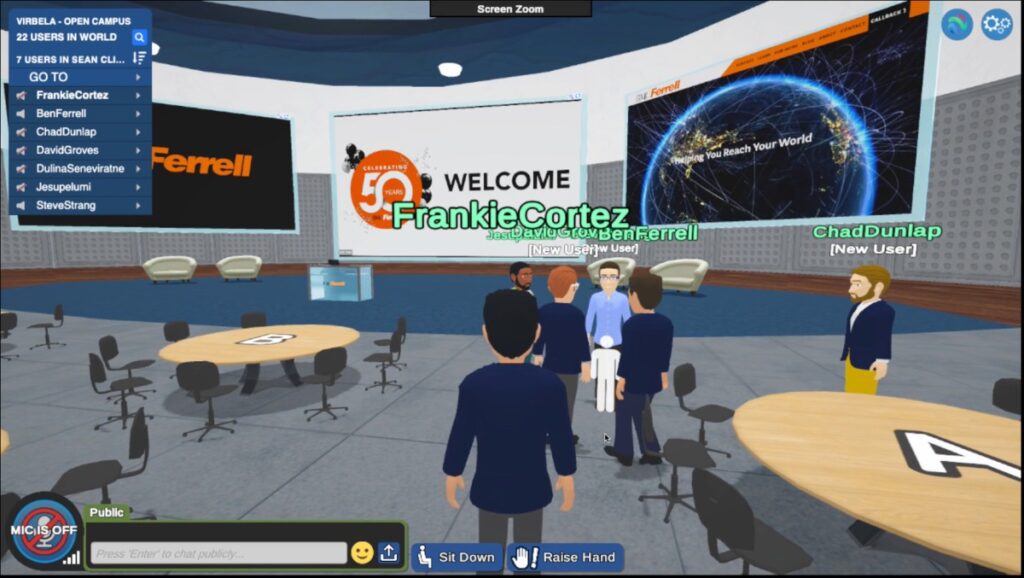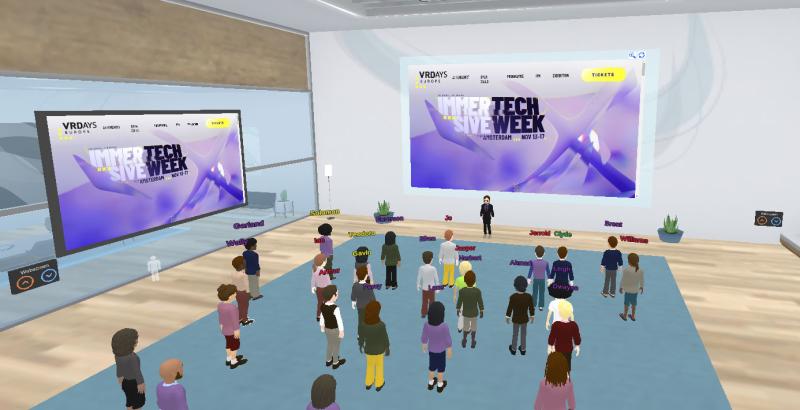The metaverse is a shared virtual world where people can interact with each other and digital content realistically. Though the metaverse is still in its early stages, it’s already being used for large events in the secular world. For example, the Australian Tennis Open launched the first major sporting event in the metaverse in March 2022. In April 2020, rapper Travis Scott performed in a virtual space in Epic Games’ “Fortnite” gathering over 12 million live attendees and 27 million total viewers.
The Pros of Metaverse Virtual Events

There are several benefits to holding virtual events in the metaverse. The metaverse offers a unique and exciting opportunity for Christian events and church members. With the metaverse, there are no geographic boundaries – anyone from anywhere in the world can attend. Additionally, virtual events can accommodate an unlimited number of attendees without compromising on health and safety. Finally, a virtual event is cost-effective for both hosts and attendees. All of these factors make virtual events an attractive option for churches looking to engage their congregation in a new and innovative way.
Anyone from anywhere in the world can attend a virtual event.
Imagine going to a live 3-day conference with attendees from every continent in the world. Sounds too good to be true right? It’s possible in the metaverse. There are no geographic boundaries in the metaverse, so anyone from anywhere in the world can attend a live metaverse event. This makes event planning much easier and more inclusive than traditional events, which are often limited by location.

Virtual events can accommodate an unlimited number of people without compromising health and safety.
A virtual event also has the potential to be much safer than traditional events. With no need for physical contact, you can host a large event with no risk of contracting or spreading infectious diseases. Virtual events also eliminate security risks that are present in regular in-person events. Attendees can feel safe and secure in the comfort of their homes while experiencing an immersive event.
A virtual event is more cost-effective for both hosts and attendees.
Hosts can save money on the venue, decorations, security, catering, production costs, insurance, permits, and much more. Attendees can save money on travel, lodging, and food expenses. With all of these benefits, it’s no wonder that virtual events are becoming more popular each day.
The Cons of Metaverse Virtual Events

There are also some drawbacks to holding events in the metaverse. First, not everyone is comfortable with the idea of virtual events, so you may alienate some potential attendees. Second, the planning process can be very tedious. Third, there can still be some glitches.
Not everyone is comfortable with the idea of virtual events, so you may alienate some potential attendees.
While the metaverse offers many positives, not everyone is comfortable with the idea of virtual reality. For some people, the metaverse can be overwhelming and even scary. Additionally, many don’t have access to a virtual reality headset. Furthermore, in the Christian community, some don’t agree that the metaverse can be used for God’s Kingdom. So, if you’re planning a metaverse event, you need to be aware that not everyone will be comfortable attending virtually. You may need to offer alternative options for those who don’t want to experience the metaverse.

The planning process can be very tedious.
Planning a metaverse event can be a lot of work for your developer team. You need to create a virtual mockup of the event space and make it come to life with decorations, lighting, and branding just like an in-person event. Also, it’s important to consider that would work in person may not necessarily function the same in the metaverse. For example, you may consider it important to build rooms and designated areas where private conversations can take place in your event space. As people move around the metaverse, just as they would move around a physical room, they will hear and see what takes place in their surrounding environment. This can provide you with a more realistic experience but it should be mentioned to attendees that your event space is as if they were in-person.
There are still bound to be some glitches.
Metaverse technology is still relatively new and there may be some glitches. For example, you may have trouble with audio or video quality. Additionally, internet connection issues can also affect how people experience the metaverse. If you’re planning a metaverse event, it’s important to have a backup plan in case of technical difficulties. You don’t want your event to be a complete disaster because of technical issues.
Conclusion
Virtual events are becoming more popular each day. Even with some drawbacks, a virtual event can offer many benefits that traditional events simply can’t provide. With the ability to host an event without any physical contact, an online event in a virtual world can be much safer than traditional events. They’re also more cost-effective for both the host and attendees and can accommodate an unlimited number of people from around the world. Overall, the metaverse is a promising platform for Christian events. While there are some challenges to overcome, the benefits outweigh the drawbacks. If you’re planning an event, consider holding it in the metaverse.

